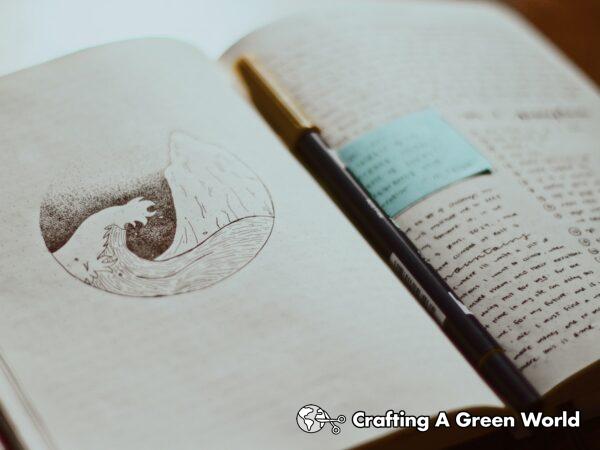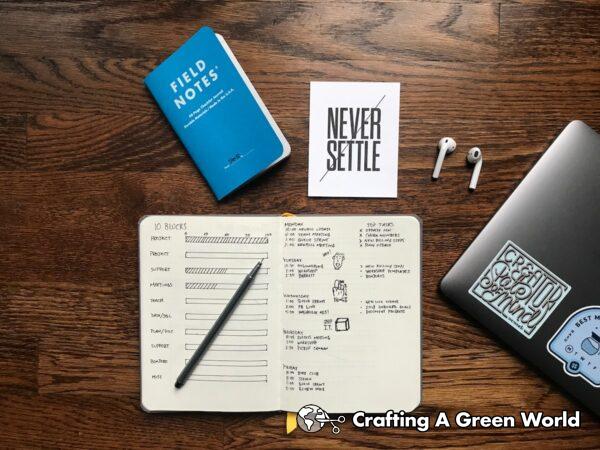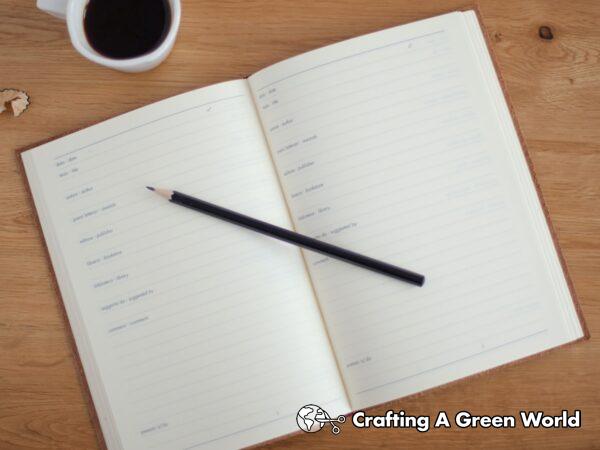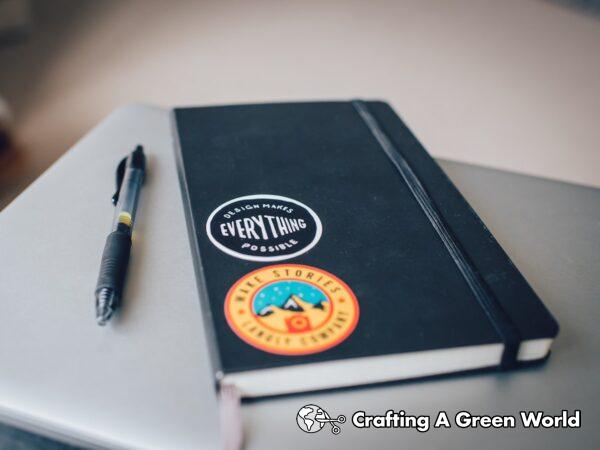Welcome to our creative hub of arts, crafts, and everything DIY. Today, we are turning our attention to the delightful world of book journaling. If you’re seeking solace in the soothing rhythm of words or sparking your imagination from the written experience, book journaling can be your perfect refuge.
In this special feature, we are excited to share a myriad of inspirational book journal ideas that’ll awaken your inner wordsmith. Whether you’re aiming to record your thoughts on literature, document the highlighted passages that moved you, or express your reactions and reflections to narratives, our chosen sources of inspiration will surely catalyze your writing journey.
So, grab your favorite pen and your journal, find your favorite reading spot, and let’s traverse this amazing journey of thoughts, ideas, and feelings together, one book at a time. 📚🖋️
Simple Book Review
A Simple Book Review in the context of a book journal serves as a personal reflection and evaluation of the books read, incorporating not just the storyline but also the reader's emotional reactions and analytical interpretations. Here are 20 writing prompts that will aid you in drawing out your thoughts for a Simple Book Review:
- Jot down your initial emotional reaction to the book.
- Write about the main theme of the book in one sentence.
- Describe a character that you strongly related to.
- Note down a quote from the book that moved you and reflect on why it resonated.
- Critique the author's writing style, noting any unique aspects.
- Reflect on a surprising plot twist or unexpected event in the book.
- Identify a subplot you particularly enjoyed and why.
- Analyse the ending of the book. Was it satisfying or did it leave you wanting more?
- Explore how the book's setting contributed to the story.
- Write about any moral lessons or ethical dilemmas presented in the book.
- Discuss the pacing of the story. Did it keep you engaged?
- Share how the book may have transformed your beliefs or perspectives.
- Compare this book to another you've read by the same author or in the same genre.
- Explain how the title ties in with the overall narrative.
- Reflect on how this book enhanced or altered your appreciation of literature.
- Highlight any issues or triggers in the book that potential readers should be aware of.
- Contemplate if the book lived up to your expectations.
- Write about your favorite scene or dialogue from the book.
- Analyse the book's cover design and how it relates to the story within.
- Reflect on whether this book has influenced you to explore more works from this author or in this genre.
Favorite Quotes Collection
Collecting favorite quotes in your book journal can create a personal anthology of wisdom, inspiration, and literary beauty that resonates with you. To start or expand your collection, consider the following 20 writing prompts:
- Jot down a quote that instantly made you smile.
- Write about a quote that has changed your perspective on a subject.
- Record a quote from a character you strongly identify with.
- Find a quote from a book you didn’t enjoy, but still had impactful lines.
- Describe why a certain quote resonates with you emotionally.
- Transcribe a quote that reminds you of a specific person or event.
- Write a quote that has helped you through a difficult time.
- List a line or quote that perfectly captures a complex feeling.
- Note down a quote you'd like to share with your future self.
- Write about a quote that challenges your current beliefs.
- Jot down a quote that inspired a life decision.
- Record a quote from a book that introduced you to your favorite genre.
- Document a quote that you would want to pass down to your children.
- Pen down a quote that you found encouraging or uplifting.
- Write a quote that involves a favorite fictional setting.
- Find a quote from a lesser-known author you appreciate.
- Write about a quote that takes you back to a cherished memory.
- Record a quote that always manages to calm you down.
- Write down a quote from the last book you read.
- Jot down a quote that you live by or would like to live by.
Character Analysis
In book journals, delving into character analysis allows us to better understand the underlying motives, development, and complexities of characters in the literature we read. Here are 20 writing prompts tailored towards character analysis in your book journal:
- Describe the protagonist in five words. What makes him/her unique?
- Compare and contrast the protagonist with the antagonist.
- How does the character's past influence their actions in the story?
- Write about a character's significant personality change throughout the story.
- Highlight any symbolic attribute of a character and what it represents.
- Analyze the character's strengths and weaknesses.
- How does a secondary character impact the story's outcome?
- Discuss a character's internal and external conflicts.
- How does the character's environment or setting influence their personality?
- Write about a quote from a character and why it’s significant.
- Describe the character through the perspective of another character.
- If you could talk to the character, what would you say or ask?
- Does the character’s end justify their means? Explain.
- Analyze a character's relationship with others and how it evolves.
- What does the character's dialogue reveal about their personality?
- Discuss a time when a character made a damaging mistake. Could it have been avoided?
- Jot down a character's biggest fear and how it affects their decisions.
- How would you react if you were in the character's situation?
- Identify a moment when a character showed growth or understanding.
- Write about the lessons you've learned from the character's experiences.
Plot Summary
Plot summaries in a book journal help encapsulate the essence of the story, giving us opportunities to reflect on the narrative's impact and explore its major themes. Here are 20 prompts to inspire your plot summary entries:
- Write a one-sentence summary of the book. What is the core of the story?
- Reflect on the main conflict in the story. How does it drive the plot?
- Identify and discuss the major turning point in the narrative. How does it change the direction of the story?
- Explore the characters' motivations. How did their desires affect the plot?
- Write about the resolution of the story. Did it tie up all the loose ends?
- Discuss any subplots and their significance to the main story.
- Reflect on the pacing of the story. Did it influence your perception of the narrative?
- How does the setting contribute to or reflect the unfolding plot?
- Write about any instances of foreshadowing. How did these hints influence the plot?
- Discuss the initial set-up of the story. How did it build up to the main events?
- Explore the consequences that characters had to face due to their actions.
- Think about the climax of the plot. How did it impact the story and the characters?
- Examine the relationship between the protagonist and antagonist. How did their interactions drive the plot?
- Reflect on any unique plot techniques the author used, such as flashbacks or nonlinear time.
- Discuss any surprises or twists in the story. Did they make sense within the plot?
- Write about the mood throughout the story. How does it align with the plot?
- Identify the main theme of the story. How is it expressed through the plot?
- How does the plot reflect the social and cultural context of the time when the book was written?
- Discuss the growth of the main character(s) throughout the plot.
- Reflect on your own predictions while reading the book. How did they align or contrast with the actual plot?
Current Reading Status
Keeping track of your current reading status adds another exciting dimension to your book journaling experience, allowing deep reflection and analysis of your reading journey. Here are 20 writing prompts to inspire you when documenting your current reading status:
- Name the book you're currently reading and write down why you picked it in the first place.
- Write about the emotions that surged up after reading the latest chapter/section.
- How do you feel about the author's writing style?
- Write a sentence or two predicting what might happen next.
- Are there any characters that you relate to? Why or why not?
- Jot down any favourite quotes or passages that stood out from this reading session.
- Illustrate your most memorable scene visually or describe the it in words.
- Which aspects of the book are capturing your attention the most, and why?
- Relate a theme or event in the book to your own life, debating its relevance or impact.
- Describe the setting of the book as you envision it right now.
- Percieve any changes in your initial impressions regarding the book.
- Creatively express how the book's cover or title relates to the story so far.
- Interpret the tone or mood of the section you just read.
- Dream up your 'ideal ending' for the book at this point in your reading.
- Judge the pace of the story. Do you wish it was slower, quicker, or just right?
- List out any words or cultural references you had to look up while reading.
- Evaluate your reading pace. Are you content with it or do you wish to modify it?
- Question any confusing parts in your current reading, or what you're curious to learn more about.
- Highlight any revelations or plot twists that surprised you.
- Forecast how you think this book might influence your choice of the next book to read.
Book Predictions
Book Predictions in journaling encourages anticipation and analytical thinking, which enhances a deeper understanding and engagement with the reading material. Here are 20 writing prompts to inspire thought-provoking book predictions in your book journal:
- Predict what might happen in the next chapter based on the characters' personalities.
- Write down what you think the ending will be like.
- Describe a potential plot twist that the author might introduce.
- How do you think the protagonist will evolve in the upcoming chapters?
- Illustrate a possible scenario in which the antagonist changes their goals.
- Predict a possible side story deriving from existing sub-plots.
- Guess how the dynamic between two characters could transform.
- Detail a new character that might be introduced to propel the storyline.
- Deducing from the current setting, predict how it may change to highlight the story's climax.
- Craft a possible dialogue between two characters revealing deeper secrets about each other.
- Write how the current conflict might exacerbate if left unresolved.
- Predict a possible sweet gesture that a character might do for another.
- Imagine a surprise meeting between two characters. What would happen?
- Envisage how the book title might come into play in the storyline.
- Write a potential dream sequence that could happen to the protagonist.
- Predict an action a character has not yet taken that could heighten the tension.
- Imagine the protagonist's reaction to discovering a truth they've been oblivious to.
- Write down a new goal the antagonist might cultivate to increase the struggle.
- Detail a possible unforeseen alliance between characters.
- Craft an unexpected conflict that might emerge and change the course of the storyline.
Cover Art Analysis
Analyzing cover art adds an enriching visual dimension to book journaling, allowing us to peel back layers of meaning in the artwork related to a story we've absorbed. Sentence prompts that explore Cover Art Analysis are as follows:
- Describe your first impression of the cover art.
- Investigate colors used in the cover art. What emotions do they evoke?
- Note the main elements in the cover design. Why do you think they were chosen?
- Write about an element in the cover art you find most interesting and why.
- Does the cover art relate directly to the story? Describe how.
- Imagine a different layout for the cover art, describe how it looks.
- If the cover art includes a character, what emotions do their expressions portray?
- If the cover art were a stand-alone piece, what story would it tell?
- Identify the art style used. What does the style contribute to the whole cover?
- Does the cover attract or deter potential readers? Justify your response.
- List any symbolic elements from the cover art that relate directly to the story.
- If the cover art were a window, what world does it open to?
- Does the cover art match the book’s atmosphere? Explain your thoughts.
- Write a brief scene inspired by the cover art.
- Describe textures used or implied in the cover art.
- Are the title and author name integrated well into the cover design? Discuss how.
- Does the cover art set appropriate expectations for the story?
- Redesign the cover via sketch or description based on a different part of the story.
- How would the cover look if it reflected one of the main themes of the story?
- Write a letter to the cover artist, highlighting aspects you admire and aspects you would change.
Reflection On Author’s Style
Examining an author's style incites a deeper understanding and appreciation of their work and enhances your personal literary journey. Here are 20 prompts bound to spark rich reflection and discussion:
- Identify one specific trait of the author's style and explain its impact on the story.
- Analyze how the author uses dialogue. Does it contribute to character development?
- Does the author's choice of words paint an overall mood or tone? Describe it.
- Consider the pacing of the book. How does it affect your engagement with the story?
- Is there a unique narrative voice that stands out? How does it contribute to your reading experience?
- Compare and contrast the author's style with that of another author you've read.
- Note any patterns you've observed throughout the book – do you think they're intentional? Why?
- Share examples of any unique, memorable syntax the author used.
- Reflect on your feelings and reactions towards the author's style – did it engross or perplex you?
- How does the author’s style reflect the time period or cultural background of the book?
- If the author's use of metaphors or similes is significant, explain their effect on the plot or characters.
- How did the author's style impact or shape your perception of the main characters?
- Reflect on a paragraph you found particularly emotive due to the author's language use.
- Were there sections where you felt the author's narrative style shifted significantly? Discuss.
- How did the author's style influence your perspective towards the central themes of the book?
- Does the author have a distinctive way of starting and ending chapters or sections? Discuss any patterns.
- Describe how the author's writing style made certain scenes particularly vivid or memorable.
- Reflect on how the author's style may have evolved over the course of the book.
- Do you think the author's style made it easy or challenging to follow the storyline?
- Would you read another book by this author solely based on their writing style? Why?
Book-to-movie Comparison
Examining a book-to-movie comparison provides an insightful way of logging your thoughts, opinions, and interpretations of each piece in your book journal, deepening your understanding and appreciation of both. Here are 20 prompts to get you started on making book-to-movie comparisons in your book journal:
- Describe your first impression of the movie adaptation in comparison to your expectations from the book.
- Discuss the most notable divergence between the book and movie adaptation.
- Identify a character that was portrayed differently in the movie. How does this change your perception of them?
- Write about a scene that was left out of the movie. How does this omission affect the storyline?
- Compare and contrast the climax in the movie with how it played out in the book.
- Contemplate the casting choices of the director. Who matched your imagination of the character and who did not?
- Analyze how the movie handles the book's most crucial plot twists.
- Explore the tone and mood of the movie compared to your reading experience of the book.
- Discuss the extended or reduced role of a character in movie against what's in the book.
- Detail your thoughts on how the ending was conveyed in the movie versus the book.
- Describe a moment in the movie that captured the essence of the book.
- Point out which major themes of the book translated well into movie and which didn't.
- Rate the overall adaptation from book to movie on a scale of 1-10 with an explanation for your score.
- Write about how the book's narration compared to the movie's cinematic techniques.
- Discuss how the movie's soundtrack amplified or diminished the message or atmosphere of the book.
- Jot down three significant quotes from the book and assess how they were used in the movie.
- Draw a parallel between the pacing of the book and movie. Was the movie rushed, or did it drag the story?
- Evaluate the effectiveness of the visual storytelling in the movie versus your imagination while reading the book.
- Mention one thing that the movie did better than the book.
- Conclude with whether you would recommend the movie, the book, both, or neither and explain why.
Exploring Literature Genres
Engaging with various literature genres in your book journal intensifies your reading world, helping you broaden your perspectives and taste. Here are 20 prompt ideas to explore different genres:
- Choose a mystery novel and predict the ending before you get there, then compare with the actual ending.
- Write about how you connect with the protagonist of a fantasy book you're reading.
- Describe the most surprising revelation in a science fiction novel you recently read.
- What is unique about the narrative structure in your favorite historical fiction read?
- Reflect on the forms of humor used in a comedy book and why they were effective (or not).
- Share your emotional reaction to a particular scene in a romance novel.
- Write about your favorite character from a thriller or horror book and why they stand out to you.
- How does a dystopian or post-apocalyptic book make you feel about our current society?
- Write a character’s diary entry for a day from an adventure book you have read.
- Discuss the ethical dilemmas posed in a political fiction work you've recently encountered.
- Review a graphic novel that made a significant impact on you.
- Reflect on the use of allegory in a particular literary novel you have read.
- How has a certain biographical book influenced your views on the person it was about?
- Write about a turning point in a play that changed your understanding of the characters involved.
- Discuss the role of magic in a fantasy novel you have read.
- Compare two characters from a multi-story collection within the same genre.
- Reflect on a young adult novel that aligns with your own teenage experiences.
- List your favorite quotes from a philosophy book.
- Write a short sequel for a stand-alone novel from any genre.
- Give a 'behind-the-scenes' description from an author's perspective within your favorite genre.
Connection To Personal Life
Journaling about our personal lives in connection with the literature we consume can deepen our understanding of both ourselves and the themes and ideas of the books we read. Here are 20 prompts to get you started on intertwining your book journal with your personal experiences:
- Write about a character whose struggles echo your own. How do their actions resonate with you?
- Document a moment from the book that brought a memory of your life to the surface. What is the connection between the two?
- Describe an emotion in the book you've intensely felt in your own life. How did the character handle it compared to you?
- Reflect on a situation from the book that changed how you perceive a past event in your life.
- List three quotes from the book that resonate with your personal journey.
- Map out how the book's setting compares or contrasts to your own environment.
- Ponder on a decision a character made that you would have done differently. Why?
- Write about a character’s relationship that mirrors one of your own. What similarities and differences do you see?
- Disclose a life event that changed your perspective similarly to a character's development in the book.
- Compare your life perspective to a theme of the book. How do you agree or disagree with it?
- Draw parallels between the climactic moment in the book and a defining moment in your life.
- Pen down how the book's ending influenced your thoughts about your own future.
- Reflect on a moral dilemma in the book and compare it to one you've faced. What were your takeaways?
- Write about a lesson from the book that you wish you had learnt earlier in your life.
- Describe a joyous moment in the book that reminded you of your personal happiness.
- List three ways in which reading this book has influenced your personal life.
- Sketch out a mental image you had while reading the book, that was inspired by your life experience.
- Write about a book character you strongly identify with. Why do they feel familiar?
- Reflect on how the book's resolution made you rethink some of your life decisions.
- Write about a plot twist that mirrors an unexpected event in your life. How did you cope with it?
Lessons And Morals
Using a book journal to explore lessons and morals facilitates personal growth by fostering morality and wisdom through literature. Here are 20 prompts to consider when examining lessons and morals in your book journal entries:
- Identify a lesson you learned from a book character's experience. How can you apply that lesson in real life?
- Write about a moral dilemma a character faced. What you would have done in their place?
- Mention a book that changed your perspective on a particular moral issue.
- Describe a time you saw a moral or ethical lesson from a book reflected in your own life.
- List five books that have significantly influenced your moral understanding.
- Illustrate a scene from a book that taught you something about forgiveness.
- Reflect upon a moment in a book where a character made a moral mistake. What were the consequences?
- Write about a time when a book's particular moral resonated with you.
- How has your sense of right and wrong been influenced by a book's storyline?
- Relate a real-life instance where you acted based on a lesson learned from a book.
- Discuss a book that challenged your viewpoint on a sensitive issue.
- Describe a book character whose moral development inspired you.
- Compare your values and moral understanding before and after reading a particular book.
- Examine a situation where a character’s moral stance conflicted with their desires. How do you relate with this?
- Recall a book that made you question your moral beliefs or societal norms.
- What's one book that has inspired you to act morally or ethically in a situation?
- Expound on a lesson learned from a book that you've used to guide your actions in a difficult situation.
- Write about a character that made a strong moral or ethical impression on you.
- Describe a fictional scenario presenting a moral dilemma. What decision would you make?
- Ponder on a book that had a profound impact on your understanding of justice or fairness.
Identifying Foreshadowing
Identifying foreshadowing in a book can enhance your understanding of the plot and characters, advancing your appreciation of the author's craft. Here are 20 prompts to help you explore the concept of foreshadowing in your book journal entries:
- Recall a moment of foreshadowing in your current read. What made it stand out as foreshadowing?
- Describe a subtle hint earlier in the book that became significant later.
- How does the use of foreshadowing enhance the overall story structure?
- Write about a foreshadowed event that surprised you. Why did it surprise you?
- Reflect on an instance where the author used dialogue as a means of foreshadowing.
- Identify a symbol in the book that acted as a forewarning of a future event.
- Recall an event that seemed minor but was in fact a foreshadow. Why did you miss it?
- Describe a successfully hidden foreshadowing, revealed only after the event occurred.
- Write about a foreshadowing that heightened the suspense in the story.
- Analyze a foreshadowing that gave deeper insights into a character's future actions.
- Reflect on foreshadowing that connected the beginning and the end of a book.
- How did the foreshadowing affect your perspective and reading experience of the story?
- Was there a recurring theme or motif in the book that served as a foreshadow?
- Provide an instance where foreshadowing added complexity to a character's development.
- Write about a seemingly unrelated narrative detail that was later revealed as foreshadowing.
- Examine a case where a character's behavior acted as a foreshadowing device.
- Describe a moment where the setting of a scene suggested an upcoming event.
- Discuss an example of foreshadowing that positioned the reader to expect a certain outcome.
- Were there red herrings that you initially thought were foreshadowings? Reflect upon them.
- Conclude with thoughts on the overall effect of foreshadowing on this particular book. Did it enrich your reading experience?
Favorite Scene Breakdown
Focusing on a favorite scene breakdown in your book journal can deepen your understanding of the writer's craft and offer fresh insights into character development and story structure. Here are 20 prompts to get you started:
- Describe in your own words the scene that touched you most in a book.
- What might be the main character's thoughts during this scene?
- Explain why you believe the author chose this particular event or circumstance in the scene.
- How would you rewrite this scene from another character's perspective?
- Identify a significant symbol or motif in the scene and explicate its meaning.
- How did the setting of the scene influence the characters' actions or decisions?
- Discuss how this scene might foreshadow future events in the story.
- Illustrate how the theme of the book was represented in this scene.
- Compare and contrast this scene with another memorable scene from the book.
- How did this scene alter or cement your opinion of a character?
- Discuss the emotions you felt while reading the scene and how they mirror or differ from the emotions of the characters.
- Imagine the aftermath of the scene, how the events might impact the characters' future actions.
- How would the scene change if it was set in a different location or time period?
- Choose a quote from the scene and explain why it resonated with you.
- How does this scene support or challenge your overall perspective of the book?
- Explore possible alternate endings to the scene.
- How does this scene align with or differ from the author's typical writing style?
- Identify a moment within the scene that surprised you, and discuss why.
- Write a script for this scene as if it were to be adapted into a movie.
- Reflect on why this scene stands out to you among all the other scenes in the book.
Fiction Vs Non-fiction Comparison
Examining Fiction VS Non-Fiction Comparison through book journaling offers us a unique lens through which we can appreciate literary styles, broaden our perspectives, and delve deeper into the crafts of storytelling and factual narration. Here are 20 prompts to inspire your creative exploration of this theme:
- Write about a fiction book and a non-fiction book you recently read. What differences in style did you notice?
- Reflect on the emotional responses elicited by both genres. Which one resonates more with you and why?
- How does the author create suspense in the fiction book? Contrast this with the technique used in the non-fiction book.
- Discuss the development of characters in the fiction book compared to the depiction of real-life characters in the non-fiction book.
- Analyze the narrative arc in both books. How does each genre approach story progression?
- Jot down thoughts on how a fiction author uses language and imagery, versus a non-fiction author's use of the same.
- Express your feelings about the resolution in the fiction book as compared to the conclusion drawn in the non-fiction book.
- Can you identify common themes between the fiction and non-fiction books? How are these themes addressed in each genre?
- Examine the author's voice in both books. Does it change depending on the genre?
- Explore how the settings in both books contributed to the overall narrative. How were they similar or dissimilar?
- Analyze the use of dialogue in the fiction book compared to the quotations or interviews in non-fiction.
- Which book made you think more profoundly, and why?
- Discuss how the fiction and non-fiction books each handle the passage of time.
- Reflect on how each genre presents challenges or conflicts to its characters/subjects.
- Talk about the educational value in the non-fiction book is against the moral lessons or themes in the fiction book.
- Write about how a particular scene could be described differently in fiction and non-fiction contexts.
- How does each genre approach descriptive writing? Give examples from the books you're comparing.
- Discuss how the fiction and non-fiction books affected your worldview.
- Contrast the use of metaphors in fiction with the usage of statistics in non-fiction.
- Which book would you read again, the fiction or the non-fiction, and why?
Exploring Themes
Exploring themes in your book journal enables you to delve deeper into the underlying messages or recurring subjects in the books you read, enriching your reading experience and enhancing your literary understanding. Here are 20 writing prompts to assist you in focusing on themes in your book journal:
- Identify the primary theme in your last read book and explain why you think so.
- Choose a recurring subject in a book you're currently reading and discuss how it is depicted.
- Write about how a particular theme added depth to the storyline in a specific novel.
- Analyse how an author uses a theme to develop their characters.
- Reflect on a theme that left an impact on you, explaining why it resonated.
- Trace the evolution of a theme throughout a novel series.
- Note down any metaphors, symbols or motifs related to a theme.
- Explore the connection between a theme in your book and your personal experiences.
- Assess how a historical or cultural context may influence the theme of a book.
- Discuss a theme that seems prevalent across different works by the same author.
- Write about a theme that challenged your preconceived notions or beliefs.
- Explore how a specific theme is represented differently in two books.
- Draw correlation between a certain theme and the author's use of language and style.
- Analyse how the title of the book is related to the main theme.
- Consider how the theme of a book might inspire change, whether social, personal, or political.
- Write about a book where theme and plot seem to be equally important.
- Reflect on a book where the ending impacted the way you interpreted the theme.
- Detail how a background character's story supports the main theme.
- Write a small poem or paragraph enriched with the primary theme of your recent read.
- Anticipate the possible themes of a book you're about to read based on its blurb or reviews.
Favorite Supporting Characters
Focusing on your favorite supporting characters can bring a new depth to your reading experience, highlighting new angles and interesting facets of the plot you might miss otherwise. Try these 20 writing prompts about Favorite Supporting Characters to explore their roles, personalities, and impacts:
- Write about why a particular supporting character is your favorite. What qualities do they possess?
- Imagine a day in the life of your favorite supporting character. How would it go?
- Pen an imaginary dialogue between your favorite supporting character and the protagonist.
- Explore a scene from the perspective of your favorite supporting character. How would they interpret what happened?
- Think of a key moment your favorite supporting character was involved in. How did it impact the overall plot?
- Write a background story for your favorite supporting character.
- Describe a hidden talent or hidden facet of your favorite supporting character.
- Write about a lesson the protagonist could learn from your favorite supporting character.
- If your favorite supporting character was the protagonist, how would the story change?
- Describe the relationship between your favorite supporting character and the antagonist.
- What kind of book would your favorite supporting character enjoy reading?
- Create a timeline of events from your favorite supporting character’s point of view.
- Imagine a scenario where your favorite supporting character meets you. How would the conversation go?
- How has your favorite supporting character impacted the decisions of the protagonist?
- Imagine a scene where your favorite supporting character makes a big mistake. How would they handle it?
- If your favorite supporting character could change one event in the book, what would it be and why?
- Write a letter to your favorite supporting character – what would you tell them?
- Describe an alternate ending to the book from the viewpoint of your favorite supporting character.
- If your favorite supporting character was given their own spin-off story, what would it be about?
- Using the events and themes of the book, write an inspirational quote that your favorite supporting character might say.
Noting Literary Devices
In noting literary devices within your book journaling process, you dive deeper into dissecting and appreciating the styles, techniques, and intricacies that writers use to enrich their stories. Here are 20 writing prompts to help you begin this process:
- Record an instance of symbolism from the book you're reading. Why you think the author chose this symbol?
- Dedicate an entry to the theme of the book. How does it resonate with you?
- Write about an example of foreshadowing in the story. Did it surprise you when it came to fruition?
- Note down a metaphor used in the book. Why do you think it was effective?
- Select a passage with powerful imagery. How did it enhance your reading experience?
- Identify an example of alliteration. How does it contribute to the mood or the setting?
- Find a use of dramatic irony. How did it affect your perspective of the character or situation?
- Discuss a conversation where subtext is used. What is being implicitly communicated?
- Examine a character’s development throughout the book. Is it static, dynamic, flat, or round? Why do you think so?
- Note down an instance of an unreliable narrator. How did you realize the narrator’s unreliability?
- Identify a paradox in the story. How does it add complexity to the plot or characters?
- Write about an instance of a flashback. How does it provide context or enhance depth to the story?
- Find an example of hyperbole. How does it impact the tone of the piece?
- Select a surprising plot twist. How did it affect your understanding of previous events?
- Identify a situation where dramatic tension is built. What makes it effective?
- Note down an example of allegory. How does it relate to the broader theme of the book?
- Analyze an instance of a simile. How does it illustrate the scene or the character's state of mind?
- Identify a use of personification. How does it contribute to the mood?
- Discuss the use of repetition in the story. How does it emphasize certain ideas or themes?
- Write about the significance of the book's title. Are there layered meanings to it that you didn’t initially realize?
Analyzing Dialogue
Analyzing dialogue within a book can reveal rich insights about the characters, their relationships, and the plot. Here are 20 prompts to inspire your exploration of dialogue in your book journal:
- Note a piece of dialogue that made you laugh or cry. What about it stirred such an emotional reaction?
- Identify a piece of dialogue that you think perfectly captures a character's personality. Why do you believe so?
- Jot down a conversation where the characters are not saying what they truly mean. What underlying emotions or thoughts are they concealing?
- Write about a dialogue that changed the course of the story. How did it influence the plot?
- Choose a conversation that gave you a new understanding or perspective. How has it affected your perception of the story?
- Reflect on a piece of dialogue that seemed out of character. Why did you find it surprising?
- Find a dialogue that reflected a certain time or place. How does it help you understand the setting and context of the story?
- Examine a dialogue that heightened the tension in the story. What was its impact?
- Analyze a conversation that revealed a significant plot twist. How did it change the narrative?
- Draw attention to a line of dialogue that raised questions in your mind. What did you ponder over?
- Describe a dialogue that showed the dynamics of a relationship. What insights did it give you?
- Connect a dialogue to a key theme of the book. How does it embody or express this theme?
- Observe a conversation that foreshadows a future event. How does it set up anticipation?
- Highlight a dialogue that brought out stark contrast between two characters. What differences did it underscore?
- Write about a conversation that gave you an 'aha' moment. What realization did it trigger?
- Point out a dialogue that revealed a character's secret or hidden facet. How did it add depth to the character?
- Examine a contentious dialogue. What conflict did it expose and how did it propel the story?
- Highlight a dialogue that indicates a turning point in a character's personal growth. How does it mark this evolution?
- Analyze a dialogue associated with the climax of the story. How does it contribute to the rising action or resolution?
- Reflect on a beautiful or memorable piece of dialogue. Why has it stayed with you?
Thoughts On Book Ending
Reflecting on book endings through journaling prompts us to delve deeply into the story's resolution and our own emotional response to it, further expanding our understanding and connection to the narrative. Here are 20 prompts to help encourage thoughts on book endings:
- Describe your immediate reaction to the book's ending in five words.
- Imagine an alternative ending for the book. How might it shift the narrative?
- How did the conclusion resonate with the story's overall theme?
- Write a letter to a character who didn't survive until the end. What would you say?
- Reflect on potential reasons behind the author's choice for the ending.
- Come up with a sequel based solely on the ending.
- Write about a plot element or character you wish had a different resolution.
- Share your thoughts about a particular sentence or paragraph from the ending that stuck with you.
- Think about how the book's ending affected your perspective of the main character.
- Write a poem inspired by the story's conclusion.
- How would you explain the book's conclusion to a friend who hasn't read it?
- Mention one thing that was left unresolved after the story ended. How does it make you feel?
- Create a dialog between yourself and the author discussing the ending.
- Describe how the ending played upon your emotions – were you surprised, elated, disappointed?
- Write a review of the book's ending as if you were a professional critic.
- Discuss the connection between the beginning and ending of the book.
- Write about the final scene from the perspective of a side character.
- Consider whether the book's ending was expected or out of the blue. How does it impact your view of the story?
- Think about how the ending would change had a secondary character played the main role.
- Write about how the ending is a reflection or departure from the world we live in today.
Reading List And Progress
Incorporating Reading List and Progress into your book journal can be an effective way to organize your book journey and track your literary growth. Here are 20 prompts to help inspire entries about Reading List and Progress in your journal.
- List down the books you've planned to read for the month.
- Write about why you've chosen these books for your reading list.
- Update the progress of the current book you're reading.
- Discuss any difficulties or challenges you're facing in making progress on your reading list.
- Write about the most impactful book you've read recently and why it has influenced you.
- Reflect on certain books from your list that are taking you longer to finish. Why is that?
- Share your thoughts on a book from your list that you genuinely enjoyed.
- Revisit your reading list and decide if there are any books that you no longer wish to read.
- Plan a reading strategy for your next book based on what's worked for you and what hasn't in the past.
- Update any changes to your goals or hopes of what you'd like to achieve from your reading list.
- Discuss the progress that you’ve made overall on your reading list this year.
- Write about any changes you have noticed in your reading preferences or choices.
- Reflect on a book from your list that you didn't enjoy. What didn’t sit well with you?
- List key lessons or favorite quotes from books from your reading list.
- Write about a book you revised, how was the second experience?
- Express your thoughts about the pace at which you're progressing through your reading list.
- Discuss your feelings about a highly anticipated book from your reading list.
- Write a short review of a book you've just finished from your reading list.
- Reflect on books from your list that greatly exceeded your expectations.
- Update your thoughts about your current reading list, would you recommend any book to someone else?
Author Background And Context
Exploring the depth of author background and context can enrich your understanding of a book, shedding light on the underlying themes and motivations richly woven throughout the text. Here are 20 writing prompts to delve into the author's background and context:
- How might the author's upbringing have influenced the themes present in the book?
- Write about the historical period the author lived in. How could this have impacted their writing?
- Identify key events in the author's life. How do these reflect in the book's narrative?
- List the societal issues prevalent during the author's time. How are they manifested in the book?
- Consider the author's education. How has it shaped the ideas conveyed in the book?
- Detail the author's political and social engagements. How do these ideas infiltrate the work?
- Write down any personal hardships experienced by the author. How have these struggles influenced their writing style or narrative?
- Reflect on how the author's relationships could have contributed to character development in the book.
- Explore the author's career progression. How has it moulded the setting and plots in their work?
- Contemplate on the author's religious beliefs or philosophical views. How were they incorporated into the book?
- Write about the author's geographical location. How does it color the setting or descriptions within the book?
- Discuss the cultural context the book was written in. How does this worldwide view influence the text?
- Contemplate on the author's gender and/or race. How does this perspective impact the tone, themes, and characters in the book?
- Explore the author's other works, if any. How do they relate to the book you're currently reading?
- Discuss how the author’s hobbies or interests might influence characters or events in the book.
- Reflect on possible influences from other authors or books on the author's writing.
- Write about how the author's nationality and associated traditions, customs, and norms might be represented in the text.
- Discuss the author's professional background. Does it play a role in the book’s narrative or perspectives shared?
- Look into the author’s health and any impacts this could have on the themes or mood of the book.
- Reflect on how public sentiment towards the author might affect your interpretation of the book.
Favorite Books Ranking
The concept of Favorite Books Ranking involves determining a hierarchy of your most-liked books, giving you an understanding of your particular literary taste and preferences. Here are 20 prompts to create your unique book ranking:
- Write a list of all the books you've read in the past year.
- Based on memory, rank these books from most enjoyed to least.
- Reflect on that top-ranked book – what makes it your favorite?
- Think about the book at the bottom – what elements did you not enjoy?
- Consider if the ranking was influenced more by the writing style or the story itself.
- Group the books by author, then rank your authors based on these groupings.
- Rank the books based solely on their character development.
- Create a ranking based on imaginative and original plotlines.
- Consider if the timing of reading a certain book affected its ranking. Would it change if you read it at a different period in life?
- Rank books within genres. If there are significant differences, reflect on why.
- Reflect on novel adaptations – has a play, movie, or series impacted a book's ranking for better or worse?
- Write a list of books you want to read, then predict their ranking based on reviews, blurbs and your interests.
- Have you ranked series books collectively or independently? Reflect on why.
- Reflect on surprises in your ranking – which books ended up higher or lower than expected and why?
- Think about books you have read multiple times. Do they rank higher?
- Suppose you could only recommend five books from your list, which would they be and why?
- Consider how your favorite book of this year ranks with your all-time favorites.
- Rank your books based on the richness and depth of their themes.
- If you could select only three books to save in a fire, which ones would they be and why?
- Consider how your ranking might change in the future and predict what could impact this.
Book Club Discussion Notes
Book Club Discussion Notes provide an engaging medium of maintaining a record of perspectives, thoughts, and opinions shared during book club sessions and expanding on those ideas in your book journal. For inspiration and varied elements to capture in your journal, consider these 20 writing prompts:
- List some interesting opinions shared about the book's character development.
- Summarize the main plot or theme debated during the book club discussion.
- Jot down any unanswered questions you or others had about the book's ending.
- Write about an idea from the discussion that challenged your prior understanding of the book.
- Describe the general atmosphere of the meeting and how it influenced your perception of the book.
- Highlight any contrasting views that emerged about the author’s writing style.
- Note down any additional research or reading someone recommended to better understand the book.
- Reflect on any profound quotes from the book shared in the discussion.
- Write about an analogy or metaphor a club member used for explaining a book's concept.
- Discuss a member's take on the book that differed sharply from your own.
- Reflect on how the setting and time period of the book was discussed in the meeting.
- Write about any unique perspectives on a character's motives or behaviour.
- Log any points of agreement or disagreement about the book’s themes.
- Discuss how the book club’s opinions aligned or clashed with critical reviews you’ve read.
- Write about any connections the group made between the book's plot and real-world events.
- Cafefully observe which parts of the discussion emotionally moved you or others in the club.
- Note any predictions made about the sequel or the future of a character, if applicable.
- Jot down red herrings that fooled you or other club members.
- Write about an interesting connection made between the book and another work of literature.
- Reflect on how the book or the discussion might change your reading preference in the future.
Motifs And Symbols In The Book
Recognizing and exploring Motifs and Symbols in the Book allows us to delve deeper into the narrative, enhancing our interpretation and personal connections with the story. Here are 20 prompts intended to encourage a detailed analysis of motifs and symbols through your book journal entries:
- Note down a potent symbol you observed in the book. How does it contribute to the overall theme?
- Identify a recurring motif in the book. How does it help develop the storyline?
- Write about a character symbolically portrayed in the book. What does this character represent?
- Explain how an object becomes a significant symbol in the book.
- Point out the evolution of a motif throughout the book. How does it enhance the narrative experience?
- Describe how a symbol profoundly affected your interpretation of an event in the book.
- Share your thoughts about how a specific symbol contributes to the book's mood and tone.
- Identify a motif that deepened your understanding of a character. How did it achieve this?
- Pick a symbol and reinterpret it in your unique perspective. How does it differ from the book's portrayal?
- How does an identified motif influence your emotion or reaction to the story?
- Discuss how the author uses symbols to illustrate abstract ideas.
- Inspect the cover of the book. Are there symbols which offer foreshadowing of the story within?
- Point out any symbolic use of colors, numbers, or names in the story.
- Discuss how an unexpected symbol in the book has a significant impact on your interpretation.
- Write about a motif that initially seems minor but turns out to be vital to the storyline.
- Interpret a specific symbol from the viewpoint of different characters in the book.
- Examine the symbolism associated with a major turning point in the story.
- How does a motif you've identified relate to the book's title?
- Explore your reaction to a symbol or motif in the book that you found perplexing or confusing.
- Discuss the influence of a particular culture, history, or mythology on the symbols and motifs used in the book.











